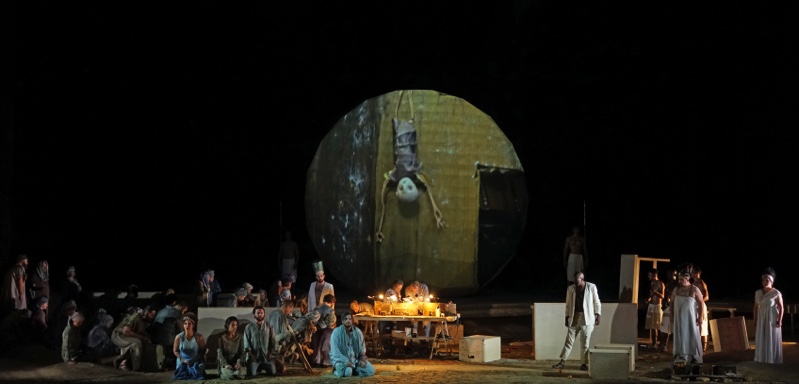Mosè in Egitto, Bregenzer Festspiele, July 2017
Posted on 21 July 2017This 1818 Rossini opera about the Hebrew Exodus involves a love affair between the Pharaoh’s son Osiride and a Hebrew girl called Elcia. Moses’ attempts to lead his people out of captivity are opposed by Osiride, who is unwilling to lose Elcia, and after numerous emotional conflicts the opera ends with the crossing of the Red Sea where the pursuing Egyptians are drowned.

Hebrews, tech team, Egyptians, all images Bregenz Festival/ Karl Forster
For this co-production with Oper Köln, Dutch director Lotte de Beer and Dutch theatre group Hotel Modern have contrived all sorts of theatrical ideas to bring home the devastation of armed conflict, the plight of migrants crossing water to escape servitude or war, and the god-like forces affecting the lives of ordinary folk, but their very busy staging unfortunately detracts from the human emotions inherent in this work. Before the start we see a three-person team on stage preparing for the opera. They remain involved throughout the action, creating the impression of god-like power as they apparently control events from a stage model and manipulate the performers as if in a rehearsal. This renders the opera characters as mere cardboard cut-outs, and just as you feel they might acquire further dimensions the tech team reappears to influence and observe events. Occasionally they allow their subjects free will and intently watch their reactions, making it difficult to sustain interest in the characters themselves.

Moses, Pharaoh, Osiride
The directing team seems more concerned with anti-war themes than the opera itself, emphasising the plight of ordinary humans with films of puppets on a circular screen. Sometimes the puppets morph into humans, as for instance when Osiride abducts Elcia in Act II. First we see two puppets on the screen, one holding a match that the puppeteers light, and then from the back of the stage Osiride and Elcia appear, he carrying a torch. This deliberate transference from puppet to human is clever, but the melange of mixed media along with occasionally puzzling actions of the god-like tech team is distracting.

Images of destruction, Amaltea, tech team
Clarity however came with the music, energetically conducted with sensitivity to the singers and the excellent chorus by Enrique Mazzola. A powerful vocal presence by Goran Jurić as Moses, with Matteo Macchioni singing a strong Italian tenor as Aaron, and Dara Savinova showing a lovely tone as their sister Amenofi (Miriam). Andrew Foster-Williams as Pharaoh sang a lyrical baritone though lacking power in the bass register, while Mandy Fredrich as his queen Amaltea sang beautifully of freedom and loss in Act II. Rossinian tenor Sunnyboy Dladla showed youthful petulance as Osiride and Clarissa Costanzo produced impassioned singing as Elcia.
Three performances in total, the remaining two on July 23 and 31 — for details click here.

